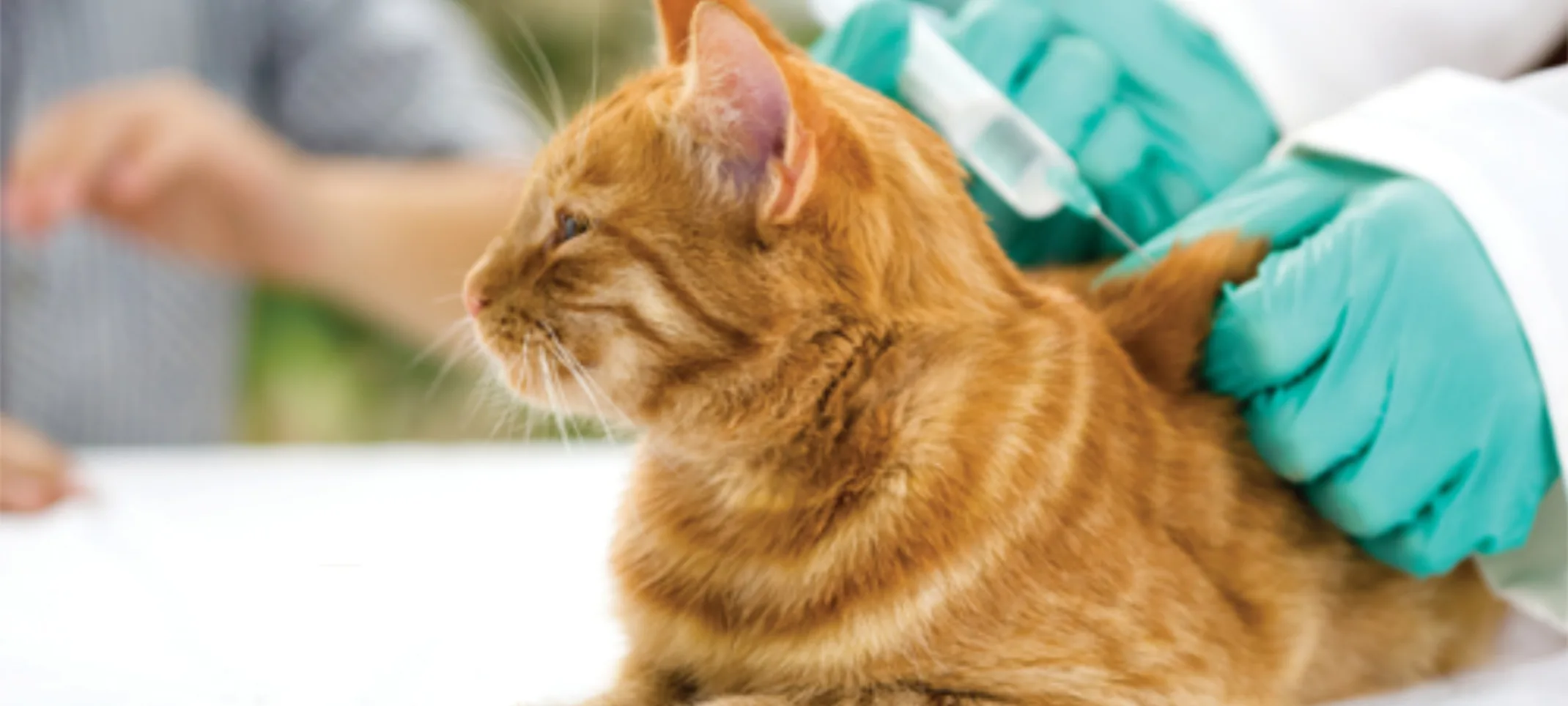Valley Veterinary Clinic Pet Lodge and Salon
Vaccinations
Preventative care is an important aspect in maintaining your pet’s health. Proper vaccination is vital in protecting them against harmful diseases.

Valley Veterinary Clinic Vaccine Guidelines
Dramatic changes have occurred in the past 10 years in the way veterinarians view vaccines and vaccination practices. The concepts of core and noncore vaccines, disease risk assessment, extended intervaccination intervals, and use of products that minimize vaccine-associated inflammation are currently parts of mainstream veterinary medicine.
Vaccination guidelines for cats were first published in 1998, and canine guidelines followed in 2003. By the end of 2006, both sets of guidelines have been reviewed extensively, updated, and published. Today the complete texts of both the American Animal Hospital Association (AAHA) canine vaccine guidelines and the American Association of Feline Practitioners (AAFP) feline vaccine guidelines are available to the entire veterinary profession. Veterinarians continue to pay close attention to the numerous, sometimes controversial, presentations and publications that address selecting and using vaccines in companion animal practice.
New Mexico State Veterinary Medical Association and the state of New Mexico adopted a 3-year rabies vaccine on January 1st, 2004. This was done because research indicated that the rabies vaccine gave longer than 1 year of immunity and rabies vaccines were labeled for a 3-year efficacy.
Recent research indicates that a number of vaccinations give longer than 1-year immunity and up to and greater than 3 years. Thus, many veterinarians across the country have adopted some form of three-year schedule on an “off label” basis, meaning these vaccines are not labeled for 3 years. Recently, some vaccine companies have made available 3-year immunity duration “labeled” vaccines and we will recommend and use these core vaccine antigens after pets have gone through the puppy and kitten series and boosters up to one year of age.
The goal of Valley Veterinary Clinic vaccine recommendations is to establish a good base of immune protection while pets are at the most risk, then begin a 3-year interval program which is still effective and labeled for our patients but will also decrease adverse reactions. We will, as always, still emphasize an annual comprehensive physical exam (biannual physical examinations for senior pets or pets with chronic conditions and/or chronic medications) with recommended vaccinations as well as preventive actions such as annual blood work, heartworm tests on dogs, annual internal parasite exam or fecal exam.
We recommend both dogs and cats be on a monthly heartworm/internal and external parasite control (Interceptor, Heartgard, Frontline), as recommended by the Companion Animal Parasite Council (CAPC).
Vaccinating your pet should not be taken lightly. Failure to vaccinate could result in your pet contracting a serious preventable disease. However, unnecessary vaccinations should be avoided. A decision to vaccinate should only come after your pet’s age and risk of exposure to disease are considered by you and your veterinarian. Vaccinations given at the appropriate age and at the appropriate intervals will greatly benefit your pet and protect it against some life-threatening diseases.
Risks of vaccination: In general, vaccines may cause localized pain or swelling, low-grade transient fever, allergic reactions such as swelling of the lips and eyelids, and mild lethargy. With any vaccine, anaphylaxis (a potentially fatal hypersensitivity reaction) may occur. Overall, the risk of any reaction is quite small compared to the risk of the diseases the vaccines protect against.
Valley Veterinary Clinic vaccine recommendations will include appropriate risk assessments with special attention paid to concerns related to pets living in the Four Corners Area where we have many stray animals and are an endemic area of diseases such as distemper and parvovirus. Factors such as age, being strictly indoors, any underlying diseases, boarding and grooming routines, travel with your pet, past vaccine reactions, etc. will be taken into account when your pet’s lifestyle is assessed.
Core Vaccines: Those vaccines which every pet should receive regardless of exposure to other pets. These are combined in the puppy and kitten series at 8, 12, and 16 weeks of age, and Valley Veterinary Clinic recommends that in our area we “adult boost” these again at 1 year of age and then transition to the 3-year alternating antigens protocol with lifestyle risk assessment.
Non-Core but Valley Veterinary Clinic and Four Corners Recommended vaccines: These are vaccines which we at Valley Veterinary Clinic feel are recommended because of where we live and our philosophy of preventing diseases which we see regularly at our practice.
Canine
Infectious Tracheobronchitis (Kennel Cough)
This is passed from neighborhood to neighborhood. Required for boarding or grooming.
Intranasal-preferred (modified live vaccine). Protection for Bordetella, Parainfluenza, Adenovirus Type II. Gives the best protection but can rarely cause slight upper respiratory symptoms. Must be given 1 week before boarding. Boosted every 6 months.
Injectable-(killed vaccine). Protection against Bordetella only. Can be boosted before or during boarding. Boosted every 6 months.
Feline
Feline Leukemia vaccine
It is recommended that all cats be tested for feline leukemia. Kittens can be born with it or it can be acquired via saliva (cat bites, shared bowls, etc)
Vaccination is recommended for any cat having any outdoor access.
It is initially given as two vaccines given 3-4 weeks apart. Then given annually. We use the “purevax” transdermal vaccination which is the safest.
Non Core Vaccines.
Vaccines which may or may not be necessary since the diseases they prevent occur sporadically, or are more common in specific circumstances, or are new or emerging diseases. These vaccines can be available and can be given based on your pet’s lifestyle risk.
In summary out vaccination philosophy at Valley Veterinary Clinic Pet Lodge & Salon is to:
Vaccinate for risk assessment associated disease
Vaccinate using a schedule that provides the best level of protection with the fewest vaccinations (antigents) per annual visit within the vaccines’ label of duration (1 or 3 year)
Use the least reactive, non-adjuvanted vaccines available, especially for cats.
Make sure we are seeing our patients at least annually for a thorough physical examination and test for at risk diseases given a patient’s breed, lifestyle, and medical history.
Educate and communicate to clients the need for senior pets and/or pets with a chronic diseases requiring the use of chronic medications, the need for twice annual physical examinations and medical progress follow ups and more frequent testing to monitor chronic conditions.
To always be available to answer our client’s questions regarding your pet’s vaccination needs
Core Vaccines for dogs:
Distemper
Hepatitis Adenovirus Type 1
Parvovirus
Rabies
Core Vaccines for cats:
Panleukopenia
Rhinotracheitis
Calicivirus
Rabies
Non-Core but Recommended vaccines for dogs:
Kennel Cough-Intranasal
Non-Core but Recommended vaccines for cats:
Feline Leukemia vaccine
Non-Core Vaccines for dogs:
Leptospirosis
Lyme Disease
Crotalus Atrox Rattlesnake Vaccine
Non-Core Vaccines for cats:
Feline Immunodeficiency Virus (we test for this with a combination test that tests for FIV and Feline Leukemia)
Bordatella bronchiseptica
Chlamydophila felis
